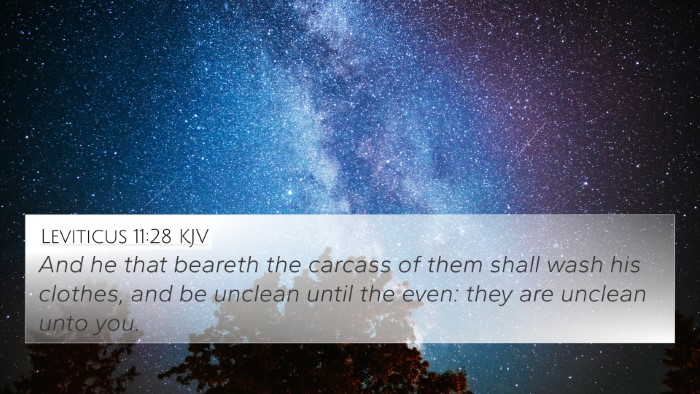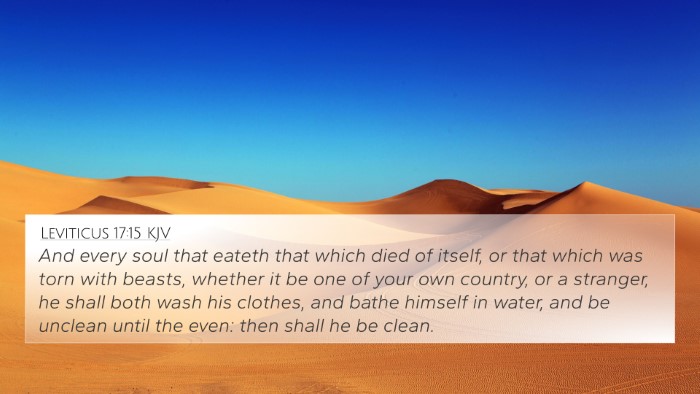Understanding Leviticus 14:46
Leviticus 14:46 (KJV): "Moreover, the house that is to be shut up shall be unclean." This verse highlights the protocols surrounding cleanliness and spiritual purity as outlined in Levitical law.
Contextual Background
This verse is part of a broader instruction regarding the purification of leprosy, particularly focusing on homes that may have been contaminated. The laws given to the Israelites served as a foundation for maintaining ritual cleanliness, which was pivotal in their covenant relationship with God.
Commentary Insights
Insights from various public domain commentaries provide deeper understanding of this verse:
- Matthew Henry: Henry emphasizes the significance of God's instructions on cleanliness, illustrating that physical ailments like leprosy represent deeper spiritual issues that require attention and rectification.
- Albert Barnes: Barnes points out that the shutting up of the house indicates the seriousness of the plague and God's desire for His people to be mindful of health, both physical and spiritual. It serves as a warning to avoid contamination, showcasing the holiness expected from God's people.
- Adam Clarke: Clarke elaborates on the role of the priest in assessing the house's condition, underscoring that spiritual leaders have a crucial role in guiding the community towards purity, reflecting the need for vigilant oversight in spiritual matters.
Cross-References
Leviticus 14:46 connects to several other scriptures that enhance its understanding and demonstrate the thematic continuity within the Bible:
- Leviticus 13:45-46: Discusses the unclean status of those afflicted by leprosy, setting the stage for the principles behind Leviticus 14:46.
- Numbers 5:2: Addresses the isolation of those who are unclean, reinforcing the need for separation to protect the community.
- Hebrews 13:11-13: Refers to the ultimate sacrifice of Christ outside the camp, connecting the physical with spiritual purity and the significance of being 'set apart.'
- Ephesians 5:5: Mentions the importance of holiness and the implications of impurity in a believer's life.
- Matthew 8:2-4: Jesus' healing of a leper signifies the transition from the old covenant practices to the new covenant of grace.
- Luke 17:12-14: Another account of Jesus interacting with lepers illustrates themes of cleansing and restoration.
- 1 Corinthians 5:6-8: Paul warns against the leaven of sin within the church, analogizing leprosy with moral impurity.
Thematic Connections
The thematic connections between these verses highlight the Bible's consistent emphasis on purity—both physical and spiritual:
- Purity and Holiness: Emphasized throughout both testaments, particularly in legal and moral instructions.
- Role of Community: The communal aspects of cleanliness and the necessity of guarding against spiritual decay underpin many biblical teachings.
- Jesus’ Ministry: The healing of the lepers in the New Testament signifies the fulfillment of the law and the new approach to sin and cleanliness that Jesus brings.
Inter-Biblical Dialogue
This verse facilitates an inter-Biblical dialogue, showing how the laws from Leviticus resonate with principles found in the New Testament:
- Physical and Spiritual Purification: Both testaments stress the importance of being spiritually clean, relating the Old Testament rituals with the New Testament's teachings on sin and redemption.
- Community Responsibility: The New Testament expands on the idea that all believers are responsible for maintaining purity within the body of Christ.
Modern Implications
Understanding Leviticus 14:46 today provides insights into the importance of maintaining both spiritual and communal integrity. The echoes of these ancient laws guide modern interpretation and application:
- Community Responsibility: As modern believers, it is our duty to address issues of purity and accountability within our communities.
- Spiritual Reflection: Regular examination of our spiritual lives in light of biblical teachings is crucial for maintaining our covenant relationship with God.
- Engagement with Scripture: Tools for Bible cross-referencing can greatly enhance our understanding of how various passages interact, encouraging deeper study and reflection.
Conclusion
Leviticus 14:46 serves as a reminder of the ongoing call to holiness in both Old and New Testament contexts. By exploring the connections between scripture, believers are equipped to understand the depth of God’s expectations for His people. Engaging with cross-referenced texts enriches our study and encourages a holistic perspective on the biblical narrative.
Additional Study Resources
For those looking to delve deeper into cross-referencing Bible verses, consider using:
- Bible concordance for more detailed connections.
- Bible cross-reference guides to uncover thematic links.
- Cross-reference Bible study tools that facilitate comparative analysis.
- Comprehensive resources for exploring inter-Biblical themes.










